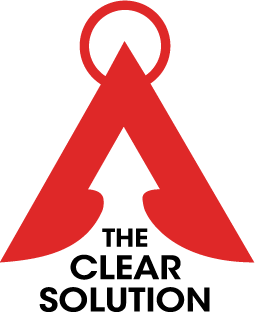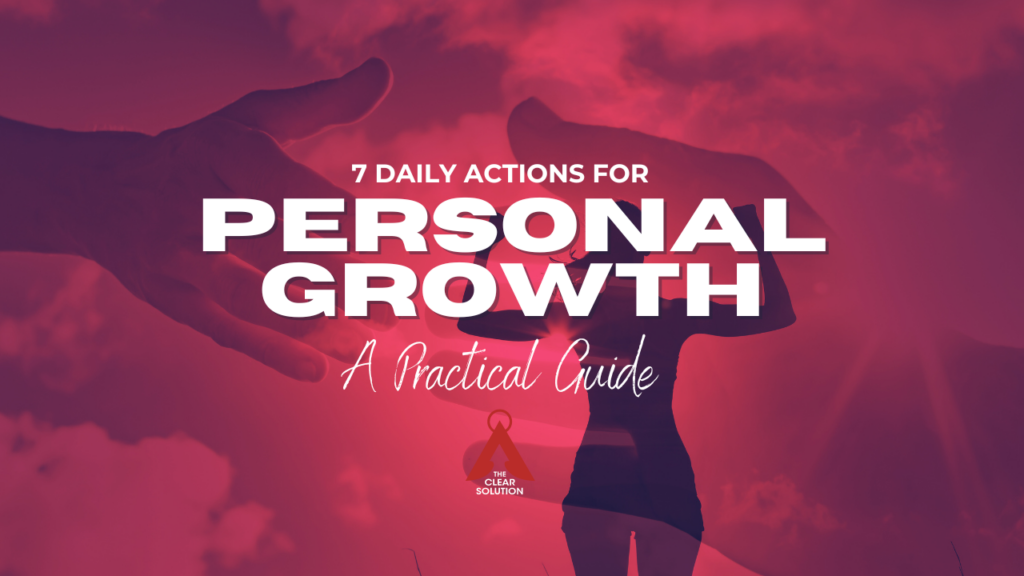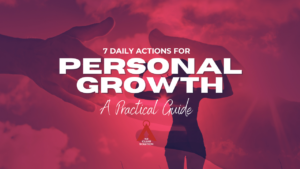Introduction:
Welcome to our exploration at The Clear Solution, where we embrace the journey towards a more mindful and compassionate existence. In today’s fast-paced world, where every moment is a rush against time, it’s essential to step back and focus on self-growth and personal development. This comprehensive guide is dedicated to unveiling seven transformative daily actions that can significantly contribute to your personal growth journey.
Each action is designed not just as a task, but as a stepping stone towards cultivating a richer, more fulfilled life. We’ll dive into practices ranging from the tranquility of mindful meditation to the empowerment of regular exercise, each carefully chosen to enhance your mental, emotional, and physical well-being. This guide is more than just a list of actions; it’s a pathway to self-discovery and improvement.
Whether you’re beginning your journey in personal development or looking to enrich your current practices, these steps are tailored to provide meaningful progress in your life. As we embark on this journey together, remember that personal growth is a continuous process. It’s about finding balance, nurturing self-compassion, and embracing each day as an opportunity to learn and evolve. So, let’s begin this transformative journey with an open heart and an eager mind.

Step 1: Mindful Meditation: The Art of Present Awareness
The first cornerstone of our journey in personal growth is the practice of Mindful Meditation. This form of meditation isn’t merely about sitting in silence; it’s an active process of cultivating awareness, presence, and tranquility in our everyday lives. In a world brimming with distractions and constant noise, mindful meditation offers a haven of peace and clarity.
Understanding Mindful Meditation
Mindful meditation involves paying attention to the present moment with an attitude of openness, curiosity, and non-judgment. It’s about observing our thoughts, feelings, bodily sensations, and the surrounding environment without trying to change or react to them. This practice roots us in the ‘now’, enabling us to witness the richness and complexity of our inner and outer world.
Benefits of Mindful Meditation
The benefits of this practice are manifold. Regular mindful meditation can significantly reduce stress and anxiety, improve focus and concentration, and enhance emotional resilience. By regularly engaging in this practice, we can develop a deeper understanding of ourselves, leading to greater self-compassion and empathy towards others. Moreover, studies have shown that mindful meditation can improve sleep, lower blood pressure, and even enhance immune function.
How to Practice
To begin your meditation journey, start with short sessions of about five minutes each day. Find a quiet and comfortable space where you can sit without disturbance. Close your eyes and focus on your breath. Notice the sensation of air entering and leaving your body. As thoughts arise, acknowledge them without judgment and gently bring your focus back to your breath.
Over time, you can gradually increase the duration of your meditation sessions. It’s not about the length of time you meditate, but the consistency and quality of your practice. Remember, it’s normal for the mind to wander; the practice is in bringing it back, time and again.
Tips for a Successful Practice
- Consistency is Key: Try to meditate at the same time each day to establish a routine.
- Guided Meditations: For beginners, guided meditations can be a helpful tool. There are numerous apps and online resources available.
- Mindfulness Throughout the Day: Try to incorporate mindfulness into daily activities, like eating, walking, or even during chores.
- Patience and Compassion: Be patient with yourself. Mindfulness is a skill that takes time to develop.
Mindful meditation is the foundation upon which we build our journey of personal growth. It teaches us to live with greater presence, understanding, and acceptance – both of ourselves and the world around us.

Step 2: Educational Reading or Listening: Nourishing the Mind
The second pivotal step in our personal growth journey is ‘Educational Reading or Listening.’ In an era where information is at our fingertips, dedicating time to expand our knowledge and understanding is more accessible and vital than ever. This step goes beyond mere consumption of information; it’s about intentionally selecting content that enriches, challenges, and inspires us.
The Power of Learning
Engaging with educational material is a powerful tool for personal development. It opens doors to new worlds, ideas, and perspectives, helping us to grow intellectually and emotionally. By exposing ourselves to diverse topics, we not only broaden our knowledge base but also cultivate empathy and understanding of different viewpoints and cultures. This continuous learning process keeps our minds active and agile, fostering creativity and problem-solving skills.
Implementing Educational Reading or Listening in Daily Life
To incorporate this practice into your daily routine, aim for at least 15 minutes of focused reading or listening each day. You can choose a variety of mediums – books, e-books, audiobooks, podcasts, or educational videos – depending on what suits your lifestyle and preferences.
- Choose Diverse Topics: Delve into subjects that interest you, but also occasionally step out of your comfort zone. This could mean exploring a new genre, a different culture, or a complex topic.
- Set Realistic Goals: Whether it’s finishing a chapter a day or listening to a podcast episode during your commute, setting achievable goals can provide a sense of accomplishment and motivate you to continue.
- Reflect and Apply: After engaging with educational content, take a moment to reflect on what you learned and how you can apply this knowledge in your life. This could involve journaling your thoughts or discussing them with others.
Recommendations to Get Started
To help you get started, here are a few recommendations:
- Books: Consider both fiction and non-fiction. Fiction can enhance empathy and imagination, while non-fiction offers direct insights and learning.
- Podcasts: Look for podcasts that cover topics of personal growth, science, history, or other areas of interest.
- Documentaries and Educational Videos: Platforms like YouTube, TED Talks, and documentary channels offer a plethora of engaging and informative content.
Remember, the goal of this step is not just to consume information but to absorb it, question it, and let it transform you. It’s about cultivating a lifelong love for learning and allowing that knowledge to shape and grow you as a person.

Step 3: Journaling: Conversations with Yourself
Embarking on the third step of our personal growth journey, we encounter the powerful tool of journaling. More than just a record of daily events, journaling is akin to having a deep, introspective conversation with yourself. It’s a practice that allows for self-expression, reflection, and clarity, offering a unique window into the depths of our thoughts and feelings.
The Transformative Power of Journaling
Journaling can be a transformative practice in several ways. It helps in processing emotions, setting and reviewing goals, and gaining insight into our behavioral patterns and thought processes. This act of writing down our thoughts provides a sense of release and can be a powerful way to manage stress and improve mental health. Moreover, journaling fosters creativity, boosts memory, and enhances our ability to articulate thoughts coherently.
Different Forms of Journaling
There isn’t a one-size-fits-all approach to journaling. It’s a deeply personal practice, and its form can vary depending on what resonates with you.
- Gratitude Journaling: Focus on the positive aspects of life by listing things you’re grateful for each day. This can significantly shift your mindset and increase overall happiness.
- Bullet Journaling: A methodical way to organize your thoughts, tasks, and goals. It’s both a planner and a diary, offering a structured approach to journaling.
- Stream of Consciousness: Write freely without worrying about grammar or structure. This can help in unearthing deep-seated thoughts and emotions.
Tips for Effective Journaling
- Consistency is Key: Try to write daily, even if it’s just for a few minutes.
- Find Your Style: Experiment with different journaling methods to find what works best for you.
- Create a Comfortable Space: Choose a quiet, comfortable spot for your journaling practice.
- Reflect and Act: Regularly go back through your entries to reflect on your growth and identify areas for improvement.
Overcoming Journaling Blocks
It’s normal to face resistance or blocks when starting out with journaling. If you’re struggling to begin, start with simple prompts like ‘How am I feeling today?’ or ‘What am I looking forward to?’ Over time, as you get more comfortable with the process, your entries will become more fluid and introspective.
Journaling is more than just a practice; it’s a journey of self-discovery and personal growth. It’s about cultivating a relationship with yourself, understanding your inner world, and using those insights to navigate the outer world with more wisdom and grace.

Step 4: Regular Exercise: Movement as a Catalyst for Growth
The fourth step in our journey of personal development is embracing the practice of Regular Exercise. Often, when we think of exercise, we focus on its physical benefits – improved fitness, weight management, and overall health. However, the impact of regular physical activity goes far beyond just physical well-being; it’s a potent tool for mental and emotional growth as well.
Holistic Benefits of Exercise
Regular exercise is a keystone habit that triggers positive changes in various aspects of life. It’s known to release endorphins, often referred to as ‘feel-good’ hormones, which naturally boost mood and reduce feelings of stress and anxiety. Furthermore, engaging in physical activities enhances cognitive functions, improves sleep quality, and boosts self-esteem by providing a sense of achievement.
Finding Joy in Movement
The key to incorporating exercise into your routine is to find activities that you genuinely enjoy. It doesn’t have to be confined to the gym or high-intensity workouts. It could be as simple as a daily walk, a dance class, yoga, swimming, or even gardening – anything that gets you moving and brings you joy.
- Set Realistic Goals: Start with small, achievable exercise goals to build confidence and momentum.
- Variety is the Spice of Life: Mix up your routine to keep it interesting and engage different muscle groups.
- Listen to Your Body: Pay attention to what your body needs. Some days that might be a vigorous workout; other days, a gentle stretching session might be more appropriate.
Creating a Sustainable Routine
Developing a consistent exercise routine requires patience and commitment. Here are some tips to help you get started:
- Schedule Your Workouts: Treat your workout time like any other important appointment.
- Track Your Progress: Keep a log of your workouts to see how you’re improving and to stay motivated.
- Find an Exercise Buddy: Having a friend to exercise with can make the experience more enjoyable and keep you accountable.
Exercise as a Pathway to Mindfulness
Exercise can also be a form of mindfulness practice. Activities like yoga or tai chi, where focus and breathing are integral, can be particularly effective in cultivating a mindful approach to life.
Incorporating regular exercise into your life isn’t just about staying fit; it’s about nurturing your mental and emotional well-being. By embracing physical activity, you’re not just caring for your body but also cultivating discipline, resilience, and joy, which are essential components of personal growth.

Step 5: Practicing Gratitude: Cultivating an Attitude of Thankfulness
As we journey through our guide on personal growth, the fifth step brings us to the powerful practice of gratitude. Practicing gratitude involves more than just saying ‘thank you.’ It’s about cultivating an attitude of thankfulness that permeates all aspects of life. This simple yet profound habit can significantly alter our perspective, enhancing overall happiness and well-being.
The Transformative Power of Gratitude
Gratitude is a game-changer. It shifts our focus from what we lack to what we have, from dwelling on problems to appreciating the abundance around us. This shift in mindset can have a remarkable impact on our mental and emotional health. Studies have shown that gratitude can reduce depression, lower stress, improve relationships, and even enhance sleep quality.
Ways to Practice Gratitude
- Keep a Gratitude Journal: Spend a few minutes each day writing down things you are grateful for. These can range from significant events to the simplest pleasures of life.
- Express Gratitude to Others: Make it a habit to thank people in your life. A simple, heartfelt expression of appreciation can strengthen your relationships and spread positivity.
- Mindful Appreciation: Take moments throughout your day to consciously acknowledge and appreciate your surroundings and experiences, whether it’s enjoying a beautiful view or savoring a delicious meal.
Benefits in Daily Life
Incorporating gratitude into your daily life can transform the way you perceive and interact with the world. It helps in developing a more optimistic outlook, improving resilience, and fostering a sense of contentment. When we focus on what we are thankful for, we naturally attract more positivity and abundance.
Overcoming Negativity with Gratitude
It’s natural to encounter negative thoughts and challenges in life. However, gratitude can be a powerful tool in overcoming these. By intentionally recognizing the good, even in difficult situations, we can maintain a balanced and hopeful perspective.
Gratitude as a Community Practice
Gratitude doesn’t have to be a solitary practice. Sharing gratitude with others, whether through community activities, social media, or in family settings, can create a ripple effect of positivity and connection.
By making gratitude a daily practice, we nurture an environment of appreciation and contentment. This practice encourages us to acknowledge the good in our lives, fostering a sense of abundance and joy that fuels our journey of personal growth.

Step 6: Setting Daily Goals: Direction for Your Day
The sixth step in our guide to personal growth focuses on the importance of Setting Daily Goals. This practice is more than a productivity tool; it’s about giving direction and purpose to each day. Setting and achieving daily goals provides a sense of control and accomplishment, vital for building self-confidence and driving personal growth.
The Impact of Daily Goal Setting
Daily goals act as stepping stones towards larger objectives and aspirations. They break down overwhelming tasks into manageable chunks, making progress more achievable and less daunting. This systematic approach to tasks and responsibilities can significantly reduce stress and anxiety, as it provides a clear roadmap for what needs to be accomplished each day.
How to Set Effective Daily Goals
- Be Specific and Realistic: Goals should be clear and attainable. Instead of setting vague goals like ‘work more,’ specify what you want to achieve, such as ‘complete the first draft of a report.’
- Prioritize Your Goals: Not all tasks have equal importance. Prioritize your goals based on urgency and significance.
- Balance Short-term and Long-term Goals: While daily goals are generally short-term, they should align with and contribute to your long-term objectives.
- Write Them Down: Writing your goals can significantly increase your commitment to them. Keep them visible as a reminder throughout the day.
Integrating Goals into Your Routine
Incorporating goal-setting into your daily routine requires discipline but can be made easier with a few strategies:
- Morning Planning: Dedicate a few minutes each morning to set your goals for the day.
- Use Tools and Apps: Utilize planners, apps, or digital calendars to organize and track your goals.
- Review and Reflect: At the end of the day, review your goals, reflect on what you achieved, and plan for the next day.
Overcoming Obstacles in Goal Achievement
It’s normal to face days when you don’t meet all your goals. When this happens, it’s important not to be overly critical of yourself. Instead, assess what hindered your progress and adjust your approach accordingly.
The Ripple Effect of Daily Goals
The practice of setting and achieving daily goals can create a positive ripple effect in all areas of life. It enhances focus, boosts productivity, and builds a sense of competence and self-efficacy. This habit, over time, contributes to a more organized, purposeful, and satisfying life, laying a strong foundation for continual personal growth and achievement.

Step 7: Networking and Relationship Building
The final step in our guide to personal growth is Networking and Relationship Building. Personal growth isn’t a solitary journey; it thrives on connections, interactions, and relationships. This step is about recognizing and fostering the value of connections in our lives, both professionally and personally. Building a strong network and nurturing relationships can lead to new opportunities, support systems, and a deeper understanding of the world and ourselves.
The Importance of Relationships in Personal Growth
Relationships are mirrors that reflect aspects of ourselves we might not see alone. They challenge us, support us, and help us grow. Networking, on the other hand, exposes us to new ideas, perspectives, and opportunities. It expands our understanding and can often be a catalyst for personal and career development.
Building Meaningful Connections
- Be Genuine: Authenticity is key in building relationships that are meaningful and lasting.
- Listen Actively: Good relationships are built on mutual respect and understanding, which starts with genuinely listening to others.
- Offer Value: Networking is a two-way street. Think about how you can help others as you build your connections.
- Stay Open and Curious: Be open to meeting people from diverse backgrounds and industries. This diversity can enrich your life in unexpected ways.
Maintaining and Deepening Relationships
It’s not just about building connections; it’s equally important to maintain and deepen them. This requires effort and time.
- Regular Check-ins: Regularly reach out to your connections, even if it’s just a quick message or a coffee catch-up.
- Be Supportive: Offer your support in their endeavors, whether it’s providing feedback, resources, or just being there to listen.
- Celebrate Achievements: Acknowledge and celebrate their successes.
Networking in the Digital Age
In today’s connected world, networking isn’t limited to in-person events. Social media platforms, professional networking sites, and online forums provide ample opportunities to connect with like-minded individuals and professionals globally.
- Leverage Social Media: Use platforms like LinkedIn, Twitter, and industry-specific forums to connect and engage with others.
- Attend Virtual Events: Webinars, online conferences, and workshops are great places to meet new people in your field.
Nurturing Growth Through Community and Connection
Networking and relationship building are essential components of personal growth. They open doors to new possibilities, provide support and inspiration, and enrich our lives with varied perspectives and experiences. By investing in relationships, we not only grow as individuals but also contribute to the growth of others, creating a community of shared learning and development.
Conclusion:
As we conclude this journey through “7 Daily Actions for Personal Growth,” remember that every step you take is a step towards a more fulfilled and mindful life. Personal growth is an ongoing process, a journey that is as rewarding as it is challenging.
We invite you to embrace these practices in your daily life and witness the transformative power they hold. Share your experiences, insights, and progress with us and our community.
Let’s continue to grow together, fostering a life of mindfulness, resilience, and connection. Your journey is just beginning, and we are here to support you every step of the way.



